When it comes to education reform, there are in general two major camps, but there are also several variations of each. The first camp would like to blow up the system and start all over. The other camp wants to continue the status quo while working to change it in directions governed by whatever dominant force of change has the ear of the public at the time. I find my own inclinations falling somewhere between the two camps. I want to blow some stuff up while improving upon some existing stuff. Like most educators, or any people with a basic understanding of authentic assessment, I do want to blow up any notion or hint of compliance with high stakes, standardized testing. The area of improvement that I think will get us the biggest bang for the all-important, tax buck is professional development.
It has long been my position that to be better educators, we need to be better learners. Since I have worked in higher education now for a while, many teachers have said to me how they love having student teachers in their building, because they can learn so much from the “young people” about all the new stuff in education. Some variation of that phrase has been repeated by more than one educator every year since I have been working with student teachers. To me that is a big RED FLAG. It causes me to ask, “Why does a veteran teacher need to have a student bring them up to date on the latest methodology, pedagogy and technology in the field of education?” If our students are to get a relevant education, should we not have relevant educators? Why on earth would experienced educators need students to provide that which every school district in the country should be striving to provide teachers within their system?
We need to examine the way we approach professional development in education. Too often it is left up to the educators to seek out their own PD. That is good for some, but not all educators have an understanding of what they do not know. If you don’t know about something, how would you know to seek PD in that area? This is especially true of learning with technology. I have a master’s degree in educational technology. The fact is that not any of the applications or computers that I learned on, as well as the methodology in the use of those components, exists today. Very little of that degree would be relevant, if I did not continue to learn, adapt and progress with what I know. The same holds true with any degree in any profession. From the day one gets a degree, things in that area of expertise begin to change. With the influence of a technology-driven culture, things move at a much faster pace than years past causing a more rapid rate of change. Therefore, the pace at which things change has increased exponentially, while the way we provide PD to deal with these changes is relatively unchanged from years past in many, if not most schools.
PD is offered by many schools in an annual or semiannual teacher workshop day. The other method is to allow teachers to seek out their own PD on their own time, often at their own expense. Technology training for teachers is often addressed in schools. The method of choice, however, by many schools is what my friend Brian Wasson, an IT guy, refers to as the “Home Depot Method.” The district goes out and buys all the cool tools from the vendors and then tries to teach, or force feed them to the teachers. That is a sure formula for failure.
We need to change PD. It must be part of an educator’s work week, and that includes administrators. We need educators to connect with other educators to collaborate and maintain relevance. Educators need to explore their needs and address them with solutions of their choosing after exploring the options. Faculty meetings can address procedures in shared documents with educators, while using the time in meetings to discuss pedagogy, methodology, best practices and new ideas. Educators need to be supported in trying new endeavors. When we address PD as evolving and continuous, and not as a teacher workshop day, we will begin to bring relevance back to education. Schools that do this now will be the first to tell us this. Of course, we need to connect with them for that to happen. Connecting educators is a first step.



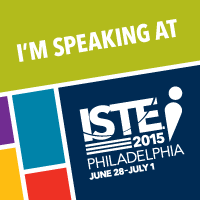



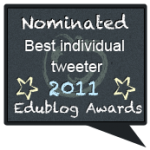
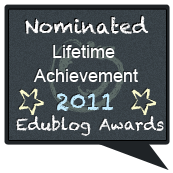

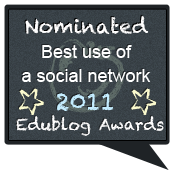
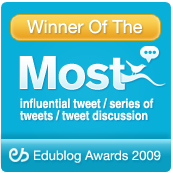
EdCamp on the 27th at Columbia would be a great beginning to fflying free and exercising our curosity modes!
Our school has moved to a 1.5 hour friday morning PD session every week, with clear direction and goals. It is the best thing we have ever done for improving our entires staff’s understanding of technology and education. It took a while to get off the ground, but it makes a clear difference in how teacher’s of all ages are teaching in our school.
[…] Bottom line is education won't change until we acknowledge we are all learners and can grow together. […]
I really like what you say, “In order to become better educators, we need to become better learners.” So very true.
I understand your red flag reaction when teacher say they learn from student teachers. Also, I see ways in which the conversation can become mutually valuable professional development for both veteran and student teacher.
When I consult with younger teacher, the first question I ask is, “What do students need to know or be able to do when they leave your room today?” The follow-up question is “How will you know they have learned it?” Then we discuss possible instructional steps that would get students to that endpoint and beyond.
Once those key points are established, the veteran teacher can share a number of ways to get to the outcome – ways that have been previously successful (with or without technology). When student teachers are invited to add ideas, they may very well suggest tools, apps, or processes that the veteran teacher never knew existed.
Many veteran teachers are frustrated with the tools (at least initially) but they have a clear understanding of where students are and where they need to go. Many new teachers are frustrated because they have the tools, but they don’t know how/where to use the tools in the context of curriculum and student instructional needs.
My veteran teaching experience allows me to listen to the new teacher’s ideas, help him/her think through the implications for classroom management, and help the teacher evaluate the pros and cons of each tool/idea they suggest.
You say, “Faculty meetings can address procedures in shared documents with educators, while using the time in meetings to discuss pedagogy, methodology, best practices and new ideas.” That is spot on. This same conversation can happen with new and veteran teachers.
Red flags should go up any time a teacher adopts a new tool for that sake of using a new tool. Also, red flags should go up whenever teachers work in isolation.
I agree with this post completely! It is sad to hear that we still have educators who can’t check their email, let alone use the latest in technology innovations to instruct their students. I want to see the day where everyone can speak a common language in technology instruction, and the students get a similar experience in each classroom in terms of innovative practices! I too teach college, and many of my students are reporting back that they are teaching their mentors a lot about things such as Google Docs. We have a vast inequity of knowledge in our system.
Tom….you are right on target with this issue. How can we commit to the changes in behavior of others, if we aren’t committed to our own?
The problem is that, if we wait for our schools and districts to make it happen, well…you know how we’ve always done it.
Somehow, some way, we have to carve out time in our day for ourselves and our growth.
Remember the warning that Flight Attendant’s give us before take off: “Put you own mask on first…”
PLN’s are the best answer. I now require that bonding in my grad ed classes. I can’t assure that it will last, but I can get it started.
The rest is up to them.
Well I would concur that this is right on target. I kept myself current by joining professional organizations. At a minimum these organizations would send out current relevant info so I was kept apprised of what was going on. And then there are the educational websites, magazines etc. Veteran teachers need to stay motivated to learn and not get in a rut. And admins are even worse as I can speak from my world. Time is never given nor money to keep admins up to date.
Of course districts need to change the paradigm of PD…it should be part of a teacher’s goals and support/time and money given to help a teacher or admin reach those goals.
I agree with you, but I’d like to go one step further. Attending more PD is not enough. We need follow through. If I go to a training to learn more about a particular method or skill, then I want time to incorporate it into my practice. I want time to reflect on what worked and what didn’t with other educators. And I want time to try, try again.
I have attended countless hours of PD over the years, but often that’s all I had time to do: attend. I didn’t have the necessary support to really change my teaching methods in the ways I waned to. Well, that’s not entirely true. I did make many changes, but I did a lot of it alone and without any constructive feedback.
bstockus….good points, and a PLN can be a great helper in that regard as well.
[…] How do educators get to know what they don’t know? I think this is an article that should be shared with your non-connected educator friends. […]
[…] When it comes to education reform, there are in general two major camps, but there are also several variations of each. The first camp would like to blow up the system and start all over. The other… […]
Just my 2 cents but we vendors should continue to build equity in the investment made to our EdTech long after the purchase. Perhaps something even as little as 1 hour a month via webinar to reinforce product knowledge and get feedback from the users in district and in Higer Ed as to how they are actually using the products would be beneficial to both. Learning from one another, building skills to use the products more effectively and us taking the info from users to help build a better product.
[…] When it comes to education reform, there are in general two major camps, but there are also several variations of each. The first camp would like to blow up the system and start all over. The other camp wants to continue the status quo while working to change it in directions governed by whatever dominant force of change has the ear of the public at the time. I find my own inclinations falling somewhere between the two camps. I want to blow some stuff up while improving upon some existing stuff. Like most educators, or any people with a basic understanding of authentic assessment, I do want to blow up any notion or hint of compliance with high stakes, standardized testing. The area of improvement that I think will get us the biggest bang for the all-important, tax buck is professional development. […]
[…] When it comes to education reform, there are in general two major camps, but there are also several variations of each. The first camp would like to blow up the system and start all over. The other… Read more, a MUST: https://tomwhitby.wordpress.com/2012/10/09/pd-how-do-educators-get-to-know-what-they-dont-know/ […]
[…] When it comes to education reform, there are in general two major camps, but there are also several variations of each. The first camp would like to blow up the system and start all over. The other… Read more, a MUST: https://tomwhitby.wordpress.com/2012/10/09/pd-how-do-educators-get-to-know-what-they-dont-know/ […]
[…] When it comes to education reform, there are in general two major camps, but there are also several variations of each. The first camp would like to blow up the system and start all over. The other… […]
Hm… Another teachers and myself have been trying to solve this very problem. Most of the teachers in my building don’t seek our any sort of PD on their own. So much so that the other teacher and myself have organized regular meetings to discuss latest developments with regards to education and such. Hopefully this will give them a bearing about what they don’t know.
[…] When it comes to education reform, there are in general two major camps, but there are also several variations of each. The first camp would like to blow up the system and start all over. The other… Read more, a MUST: https://tomwhitby.wordpress.com/2012/10/09/pd-how-do-educators-get-to-know-what-they-dont-know/ […]
[…] I am a regular reader of Tom Whitby’s (@tomwhitby) blog “My Island View.” Tom recently wrote about his thoughts on the current state of professional development in education and the need to […]
Reblogged this on iplantes.
[…] questions you don’t know the answers to. Tom Whitby recently wrote a blog post about teachers not knowing what PD they need. Do you know what you need to develop to be a better […]
[…] When it comes to education reform, there are in general two major camps, but there are also several variations of each. The first camp would like to blow up the system and start all over. The other… […]
Reblogged this on that MADDENing teacher.
Old saying: “Remember the banana: Every time it leaves the bunch it gets skinned!” Form a Professonial Learning Community and still together….